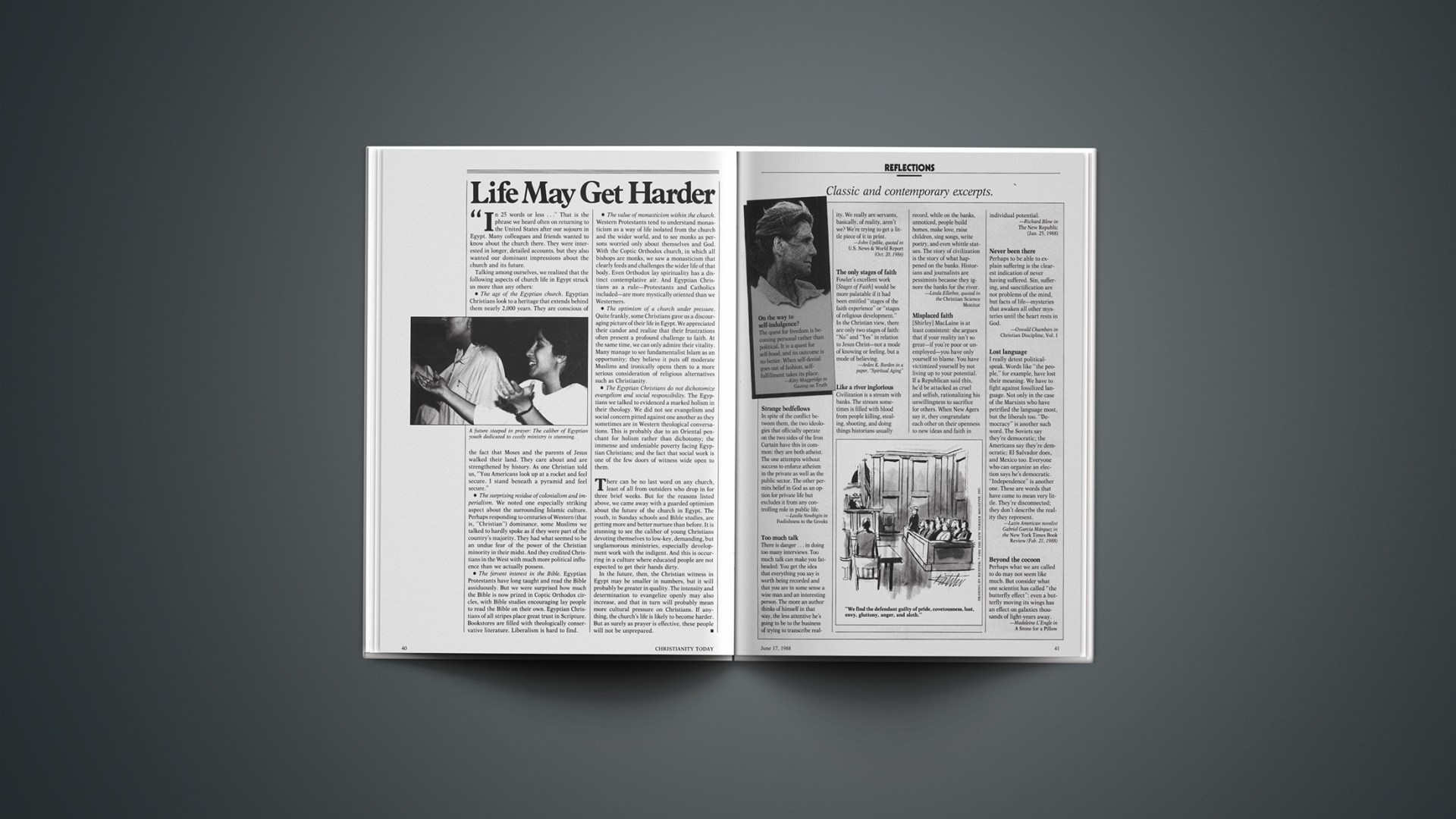“In 25 words or less …” That is the I phrase we heard often on returning to the United States after our sojourn in Egypt. Many colleagues and friends wanted to know about the church there. They were interested in longer, detailed accounts, but they also wanted our dominant impressions about the church and its future.
Talking among ourselves, we realized that the following aspects of church life in Egypt struck us more than any others:
• The age of the Egyptian church. Egyptian Christians look to a heritage that extends behind them nearly 2,000 years. They are conscious of the fact that Moses and the parents of Jesus walked their land. They care about and are strengthened by history. As one Christian told us, “You Americans look up at a rocket and feel secure. I stand beneath a pyramid and feel secure.”
• The surprising residue of colonialism and imperialism. We noted one especially striking aspect about the surrounding Islamic culture. Perhaps responding to centuries of Western (that is, “Christian”) dominance, some Muslims we talked to hardly spoke as if they were part of the country’s majority. They had what seemed to be an undue fear of the power of the Christian minority in their midst. And they credited Christians in the West with much more political influence than we actually possess.
• The fervent interest in the Bible. Egyptian Protestants have long taught and read the Bible assiduously. But we were surprised how much the Bible is now prized in Coptic Orthodox circles, with Bible studies encouraging lay people to read the Bible on their own. Egyptian Christians of all stripes place great trust in Scripture. Bookstores are filled with theologically conservative literature. Liberalism is hard to find.
• The value of monasticism within the church. Western Protestants tend to understand monasticism as a way of life isolated from the church and the wider world, and to see monks as persons worried only about themselves and God. With the Coptic Orthodox church, in which all bishops are monks, we saw a monasticism that clearly feeds and challenges the wider life of that body. Even Orthodox lay spirituality has a distinct contemplative air. And Egyptian Christians as a rule—Protestants and Catholics included—are more mystically oriented than we Westerners.
• The optimism of a church under pressure. Quite frankly, some Christians gave us a discouraging picture of their life in Egypt. We appreciated their candor and realize that their frustrations often present a profound challenge to faith. At the same time, we can only admire their vitality. Many manage to see fundamentalist Islam as an opportunity; they believe it puts off moderate Muslims and ironically opens them to a more serious consideration of religious alternatives such as Christianity.
• The Egyptian Christians do not dichotomize evangelism and social responsibility. The Egyptians we talked to evidenced a marked holism in their theology. We did not see evangelism and social concern pitted against one another as they sometimes are in Western theological conversations. This is probably due to an Oriental penchant for holism rather than dichotomy; the immense and undeniable poverty facing Egyptian Christians; and the fact that social work is one of the few doors of witness wide open to them.
There can be no last word on any church, least of all from outsiders who drop in for three brief weeks. But for the reasons listed above, we came away with a guarded optimism about the future of the church in Egypt. The youth, in Sunday schools and Bible studies, are getting more and better nurture than before. It is stunning to see the caliber of young Christians devoting themselves to low-key, demanding, but unglamorous ministries, especially development work with the indigent. And this is occurring in a culture where educated people are not expected to get their hands dirty.
In the future, then, the Christian witness in Egypt may be smaller in numbers, but it will probably be greater in quality. The intensity and determination to evangelize openly may also increase, and that in turn will probably mean more cultural pressure on Christians. If anything, the church’s life is likely to become harder. But as surely as prayer is effective, these people will not be unprepared.










